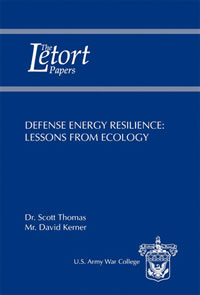Defense Energy Resilience: Lessons from Ecology

Authored by Dr. Scott Thomas, Mr. David Kerner.
August 2010
55 Pages
Brief Synopsis
Energy security is a fundamental requirement for national security, and global energy competition threatens to make Department of Defense (DoD) missions increasingly vulnerable to the whims of energy suppliers. DoD’s approach to energy security must accommodate a highly uncertain outlook for energy resource availability. Although U.S. energy security needs are currently met, the shrinking gap between global supply and demand draws the world closer to a point at which competition disrupts social and geopolitical normalizing forces, and conflict becomes likely. While DoD expresses concern over trends that are threatening energy security, Defense planners still operate as if adequate energy supplies will continue to be available without interruption into the extended future. What limited energy-related planning that is currently done addresses only the symptoms of a systemic over-reliance on very few energy resources. This analysis offers key insights into what a shifting energy security environment is, and the paper provides a novel theoretical framework for how the United States can best respond to this ever changing energy security environment.
Summary
National security relies heavily on the ready availability of energy resources in the types, quantities, and locations that the military demands. However, global energy competition is rendering those resources ever tighter, leaving the U.S. Department of Defense (DoD) missions increasingly vulnerable to even small supply perturbations. DoD’s response has been to pursue a variety of energy security-related initiatives, including conservation measures and alternative energy resources. These measures, however, must counter the ever-increasing energy demands of more and longer military actions and of employing modern weapons and mobility platforms, whose fuel use increases with each new design iteration.
DoD’s approach to energy security must accommodate a highly uncertain outlook for energy resource availability, one of contracting oil supplies, increasing demand by the developing world, and decreasing production due to an aging infrastructure and tight financing for new facilities. DoD still functions under the assumption that adequate energy supplies will continue to be available, either through technological innovation or through discovery of new resources. Several energy studies point to supply constrictions over the next 1 to 3 decades, against a backdrop of environmental pressures to reduce burning of hydrocarbon fuels. While U.S. energy needs are currently being met, the shrinking gap between global supply and demand draws the world closer to a tipping point at which human behavior is less predictable, competition overwhelms social and geopolitical normalizing forces, and conflict becomes likelier and more pronounced.
Given these concerns about future resources, DoD would be best served by devising and implementing a sustainable, resilient energy strategy that addresses current projections and adapts to evolving conditions. The U.S. Army has begun to address its energy security concerns, but has not yet formulated an enduring and flexible approach to shifting energy resources. Two concepts that have become increasingly important in modern ecological theory and conservation practice are resilience of social-ecological systems (SESs) and the adaptive management approach for managing these systems. Advances in ecosystem-based management of natural resources and sustainability science have yielded theory that is markedly different from theory arising from more narrowly focused perspectives, such as those driving conventional business and economic practices, agriculture, energy production and distribution, and security policy. Ecological resilience has been defined as the amount of disturbance that a social-ecological system can absorb without changing its structure, feedbacks, function, and overall identity. Adaptive management is exploratory policy development: the application of science to policy to produce reliable knowledge from unavoidable errors (i.e., through deliberate trial and error). These two concepts may provide a fresh perspective to inform energy security policy, with resilience providing a systems perspective on planning and adaptive management offering mechanisms for emphasizing institutional learning and an investigational approach in refining energy programs and policy.
Access Full Report [PDF]: Defense Energy Resilience: Lessons from Ecology
|
NEWSLETTER
|
| Join the GlobalSecurity.org mailing list |
|
|
|

